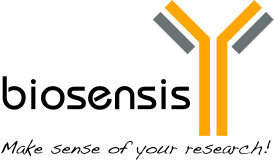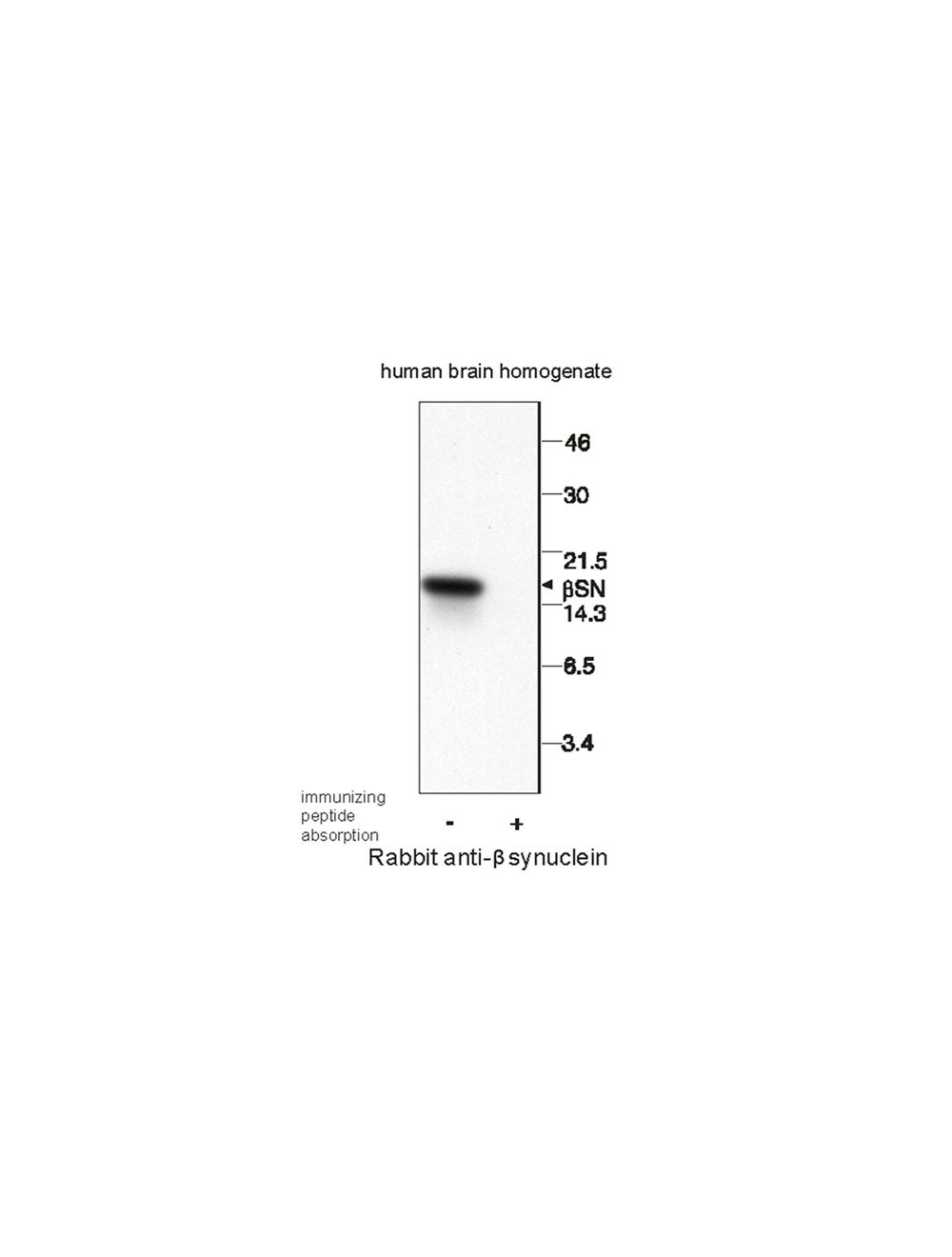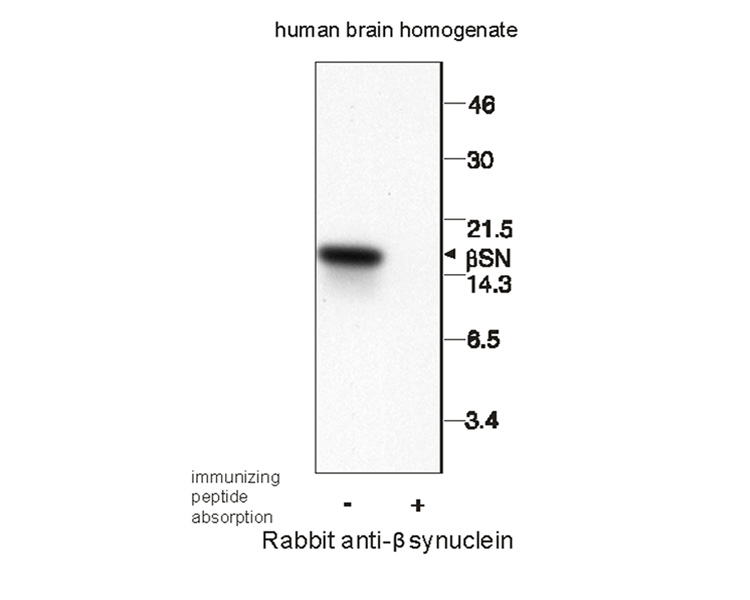Beta-synuclein, Rabbit Polyclonal Antibody
As low as
US$327.00
Only %1 left
Catalog Number
R-1683
- Product Name Beta-synuclein, Rabbit Polyclonal Antibody
- Product Description Rabbit anti-Beta-synuclein Polyclonal Antibody (Unconjugated), suitable for WB, IHC-Frozen.
- Application(s) IHC-Frozen, WB
- Antibody Host Rabbit
- Antibody Type Polyclonal
- Specificity Confirmed by WB using soluble mouse and human brain extracts, reactivity for major product diminished by peptide absorption. Does not detect alpha-synuclein as tested with recombinant protein and does not react with Lewy bodies in human Dementia with Lewy Bodies or Parkinson's disease brain tissue sections.
- Species Reactivity Human, Mouse
- Immunogen Description A synthetic peptide (AQEAAEEPLIEPLME-C) corresponding to human _-synuclein [99-113] in the C-terminal domain conjugated via additional C-terminal Cys to Diphtheria toxoid.
- Conjugate Unconjugated
- Purity Description Protein G purified IgG
- Regulatory Status For research use only.
Product Info
- Product Description Rabbit anti-Beta-synuclein Polyclonal Antibody (Unconjugated), suitable for WB, IHC-Frozen.
-
Related Products
Beta-Synuclein, Mouse Monoclonal Antibody
Beta-synuclein, Rabbit Polyclonal Antibody
Synuclein, pan, Rabbit Polyclonal Antibody
Beta-Synuclein, Rabbit Polyclonal Antibody
Synuclein, pan, Rabbit Polyclonal Antibody
Beta-synuclein, Sheep Polyclonal Antibody
Pan-synuclein, Sheep Polyclonal Antibody
Beta-synuclein, Sheep Polyclonal Antibody
- Application(s) IHC-Frozen, WB
- Application Details WB and IHC. A dilution of 1:500 to 1:1,000 is recommended for Western blot. _-synuclein is a soluble protein of 134 amino acids and detected with 17 kDa mobility by western blotting. By IHC the antibody detects synaptic sites in human brain formaldehyde-treated frozen tissue. Biosensis recommends optimal dilutions/concentrations should be determined by the end user.
- Target Beta-synuclein
- Specificity Confirmed by WB using soluble mouse and human brain extracts, reactivity for major product diminished by peptide absorption. Does not detect alpha-synuclein as tested with recombinant protein and does not react with Lewy bodies in human Dementia with Lewy Bodies or Parkinson's disease brain tissue sections.
- Target Host Species Human
- Species Reactivity Human, Mouse
- Antibody Host Rabbit
- Antibody Type Polyclonal
- Antibody Isotype IgG
- Conjugate Unconjugated
- Immunogen Description A synthetic peptide (AQEAAEEPLIEPLME-C) corresponding to human _-synuclein [99-113] in the C-terminal domain conjugated via additional C-terminal Cys to Diphtheria toxoid.
- Purity Description Protein G purified IgG
- Format Lyophilized from PBS, pH 7.4. Contains no preservative.
- Reconstitution Instructions Spin vial briefly before opening. Reconstitute in 500 µL sterile-filtered 1X PBS, pH 7.2-7.6. Centrifuge to remove any insoluble material.
- Storage Instructions Lyophilized at 2-8°C. After reconstitution, store at -20°C in undiluted aliquots for up to 6 months. The antibody may be stored short term at 2-2-8°C with an appropriate antibacterial agent. Avoid freeze-thaw cycles.
- Batch Number Please see item label.
- Expiration Date 12 months after date of receipt (unopened vial).
- Uniprot Number Q16143
- Uniprot Number/Name Q16143 (SYUB_HUMAN)
- Scientific Background Beta-synuclein is a soluble cytoplasmic protein associated with synaptic vesicles and a member of the synuclein family. Mutations in alpha-synuclein cause early onset Parkinson's disease. Expression of beta synuclein may modulate alpha-synuclein aggregation found in Parkinson's disease.
- Shipping Temperature 25°C (ambient)
- UNSPSC CODE 41116161
- Regulatory Status For research use only.
Specifications
-
General References
Culvenor, J.G., McLean, C.A., Cutt, S., Campbell, B.C.V., Maher, F., Jaekaelae, P., Hartmann, T., Beyreuther, K., Masters, C.M., and Li, Q.-X. (1999) Non-Aβ component of Alzheimer's disease amyloid (NAC) revisited: NAC and _-synuclein are not associated with Aβ amyloid. Am. J. Path. 155, 1173-118
Culvenor, J.G., Rietze, R.L., Bartlett, P.F., Masters, C.L., and Li, Q.-X. (2002) Oligodendrocytes from neural stem cells express _-synuclein: Increased numbers from Presenilin 1 deficient mice. NeuroReport 13, 1305-1308.
Li, Q.X., Campbell, B.C.V., McLean, C.A., Thyagarajan, D., Gai, W.P., Kapsa, R.M., Beyreuther, K., Masters, C.L., and Culvenor, J.G. (2002) Platelet _- and _-synucleins in Parkinson's disease and normal control subjects. Journal of Alzheimer's Disease 4, 309-315.
Quilty, M.C., Gai, W.-P., Pountney, D.L., West, A.K., and Vickers, J.C. (2003) Localization of alpha, beta, and gamma synuclein during neuronal development and alterations associated with the neuronal response to axonal trauma. Exp Neurol 182, 195-207.
George, S. Mok, S.S., Nurjono, M., Ayton, S., Finkelstein, D.I., Masters, C.L., Li, Q.-X. and Culvenor, J.G. (2010) _-Synuclein transgenic mice reveal compensatory increases in Parkinson's Disease-associated proteins DJ-1 and Parkin and have enhanced _-synuclein and PINK1 levels after rotenone treatment. J. Mol. Neurosci. 42, 243-254.
Ia, K.K., Jeschke, G.R., Deng, Y., Kamaruddin, M.A., Williamson, N.A., Scanlon, D.B., CULVENOR, J.G., Hossain, M.I., Purcell, A.W., Liu, S., Zhu, H.J., Catimel, B., Turk, B.E. and Cheng, H.C. (2011) Defining the substrate specificity determinants recognized by the active site of C-Terminal Src Kinase-Homologous Kinase (CHK) and identification of beta Synuclein as a potential CHK physiological substrate. Biochemistry, 50, 6667-6677

 1800 605-5127
1800 605-5127 +61 (0)8 8352 7711
+61 (0)8 8352 7711

